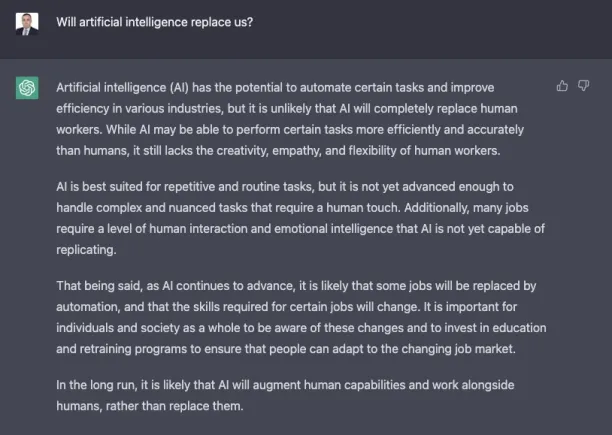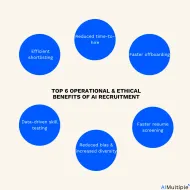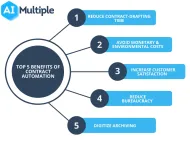Labor Shortage Automation in 2024: How Firms Can Adapt
The job market is paradoxically seeing a large amount of vacant jobs and layoffs taking place at the same time.
But “smart” companies that are:
- Taking advantage of automation possibilities to improve their operational efficiency and lower costs
- Providing a sustainable and attractive infrastructure to attract and retain talents
- Using automation to create new jobs
Can have a higher chance of battling worker shortages and attracting skilled labor. In this article, we explore the 3 ways that innovative technologies and artificial intelligence can address labor shortage.
What is the reason for the current labor shortage?
By the latest World Bank estimates, the world economy is stepping into an era of stagflation – inflation coupled with low economic growth, a phenomenon mostly seen in developing economies.
On business-side, factors such as:
- The war in Ukraine – disrupting grain supply and increasing the price of food
- Rising fuel prices
- Increasing interest rates for austerity measures – discouraging investments
- Supply chain disruptions in China – leading to shipping delays and short-term shortages
Are among the reasons that is forcing firms to hire less and fire more.
On the worker-side, factors such as:
- The Great Resignation
- Quiet quitting
Have shifted the bargaining power from employers to employees. People are now picker as to for whom, why, and how much they will work. A survey1, for instance, has shown that 1 in 5 employees is likely to change employer within the next 12 months.
What is labor shortage automation?
Labor shortage automation is using a new generation of advanced automation tools, such as RPA, virtual workers, conversational AI, augmented reality, and other cutting-edge technology to streamline the value chain. The idea is to have robots do the repeatable tasks, so human beings can tend to value-increasing tasks.
How is automation helping companies battle the labor crisis?
1. Automation is cheaper than outsourcing or hiring a new labor
Outsourcing has been a common practice for decades. But rising nominal wages is making developing world labor more expensive. And because of the following costs, domestic hire is also more expensive now:
- Wage inflation
- Employee packages
- Training costs
- The opportunity cost of the training period
- Human error
- Employees’ lower operational speed in completing manual tasks, leading to time and money loss, and more.
We claim that no matter where you are sourcing your labor from, using artificial intelligence to automate rule-based, repetitive, and time-consuming processes is more economical in the long run.
2. Automation is taking away the mind-numbing work
Automation in sales, accounting, manufacturing, and other departments can free humans from mind-numbing tasks such as:
- Copy-pasting fields
- Generating reports
- Scraping internet data
- Data extraction
- Quality control
- Fault remediation
The benefit will be a company that provides the new hire with an automated infrastructure that enables them to use their time on value-adding tasks.
A common misconception is that automation causing job loss. And while that might be true for rule-based, repetitive tasks, automation is transforming the way traditional roles are carried out. 21%2 of workers who kept their job during the pandemic had to pick up their their outgoing colleagues’ workloads. After identifying processes suitable for automation with task mining tools, they can be delegated to robots and reduce humans’ workload.

We are aware of the irony. Source: ChatGPT
3. Automation is creating new jobs
As we said, automation is transforming jobs, with software robots now able to undertake the mundane parts of the job duties. But automation is also creating new jobs.
How is automation creating new jobs?
- Robots need human oversight to ensure they are working right. No matter the automation tool, they should be constantly monitored by human beings.
- Robots can save the company time and money, which can be reinvested into retraining the workforce, running workshops, or leveraging other process automation technologies.
What specific jobs is automation creating?
Per a World Economic Forum analysis in 20203 these roles “are expected to face growing demand”:
- Data analysts and data scientists
- AI and machine learning specialists
- Big data specialists
- Digital marketing and strategy specialists
- Process automation specialists
- Business development professionals
- Digital transformation specialists
- Information security analysts
- Software and applications developers
- Internet of things specialists
For more on automation
If you are interested in learning about how automation is helping firms evolve, read:
- 4 Ways to Improve Your Business with Self-Service Automation
- 3 Ways to Combat The Great Resignation
- 6 Ways Cloud Workload Automation Transforms Your Business
And if you believe your business could benefit from adopting an automation solution, head over to our automation hub, where you’ll find data-driven lists of vendors prepared.
We will help you choose the best tool suited to your needs:
External Links
- 1. “Survey of over 52 000 workers indicates the Great Resignation is set to continue as pressure on pay mounts.” Primewire. 24 May, 2022. Retrieved on January 30, 2023.
- 2. “The great resignation is really the great recruitment” IBM. November 18, 2021. Retrieved on January 30, 2023.
- 3. “WEF Report.” CNBC. October 21, 2020. Retrieved on January 30, 2023.

Cem has been the principal analyst at AIMultiple since 2017. AIMultiple informs hundreds of thousands of businesses (as per similarWeb) including 60% of Fortune 500 every month.
Cem's work has been cited by leading global publications including Business Insider, Forbes, Washington Post, global firms like Deloitte, HPE, NGOs like World Economic Forum and supranational organizations like European Commission. You can see more reputable companies and media that referenced AIMultiple.
Throughout his career, Cem served as a tech consultant, tech buyer and tech entrepreneur. He advised businesses on their enterprise software, automation, cloud, AI / ML and other technology related decisions at McKinsey & Company and Altman Solon for more than a decade. He also published a McKinsey report on digitalization.
He led technology strategy and procurement of a telco while reporting to the CEO. He has also led commercial growth of deep tech company Hypatos that reached a 7 digit annual recurring revenue and a 9 digit valuation from 0 within 2 years. Cem's work in Hypatos was covered by leading technology publications like TechCrunch and Business Insider.
Cem regularly speaks at international technology conferences. He graduated from Bogazici University as a computer engineer and holds an MBA from Columbia Business School.
To stay up-to-date on B2B tech & accelerate your enterprise:
Follow on

Comments
Your email address will not be published. All fields are required.